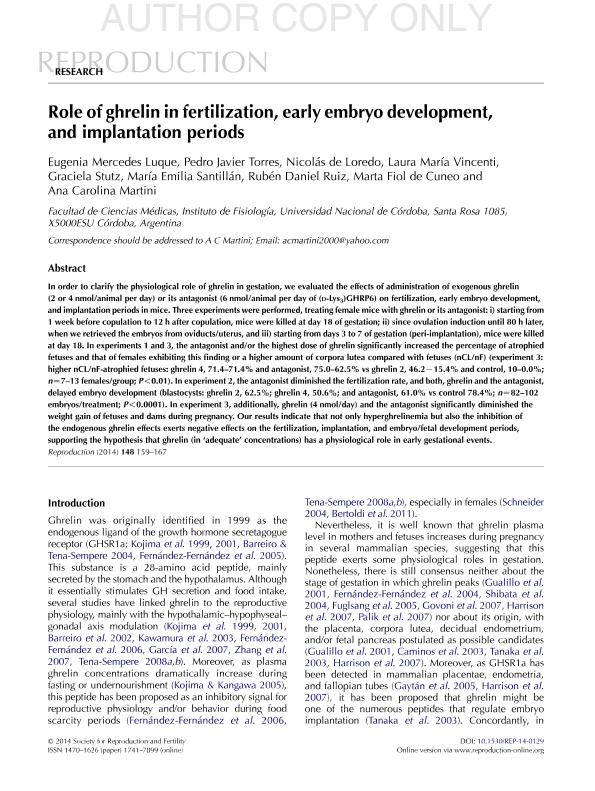Artículo
Role of ghrelin in fertilization, early embryo development, and implantation periods
Luque, Eugenia Mercedes ; Torres, Pedro Javier; de Loredo, Nicolás; Vincenti, Laura María; Stutz, Graciela; Santillán, María Emilia; Ruiz, Ruben Daniel
; Torres, Pedro Javier; de Loredo, Nicolás; Vincenti, Laura María; Stutz, Graciela; Santillán, María Emilia; Ruiz, Ruben Daniel ; Fiol, Marta Haydee
; Fiol, Marta Haydee ; Martini, Ana Carolina
; Martini, Ana Carolina
 ; Torres, Pedro Javier; de Loredo, Nicolás; Vincenti, Laura María; Stutz, Graciela; Santillán, María Emilia; Ruiz, Ruben Daniel
; Torres, Pedro Javier; de Loredo, Nicolás; Vincenti, Laura María; Stutz, Graciela; Santillán, María Emilia; Ruiz, Ruben Daniel ; Fiol, Marta Haydee
; Fiol, Marta Haydee ; Martini, Ana Carolina
; Martini, Ana Carolina
Fecha de publicación:
06/2015
Editorial:
Bioscientifica
Revista:
Reproduction
ISSN:
1470-1626
Idioma:
Inglés
Tipo de recurso:
Artículo publicado
Clasificación temática:
Resumen
In order to clarify the physiological role of ghrelin in gestation, we evaluated the effects of administration of exogenous ghrelin (2 or 4 nmol/animal per day) or its antagonist (6 nmol/animal per day of (D-Lys3)GHRP6) on fertilization, early embryo development, and implantation periods in mice. Three experiments were performed, treating female mice with ghrelin or its antagonist: i) starting from 1 week before copulation to 12 h after copulation, mice were killed at day 18 of gestation; ii) since ovulation induction until 80 h later, when we retrieved the embryos from oviducts/uterus, and iii) starting from days 3 to 7 of gestation (peri-implantation), mice were killed at day 18. In experiments 1 and 3, the antagonist and/or the highest dose of ghrelin significantly increased the percentage of atrophied fetuses and that of females exhibiting this finding or a higher amount of corpora lutea compared with fetuses (nCL/nF) (experiment 3: higher nCL/nF-atrophied fetuses: ghrelin 4, 71.4–71.4% and antagonist, 75.0–62.5% vs ghrelin 2, 46.2K15.4% and control, 10–0.0%; nZ7–13 females/group; P!0.01). In experiment 2, the antagonist diminished the fertilization rate, and both, ghrelin and the antagonist, delayed embryo development (blastocysts: ghrelin 2, 62.5%; ghrelin 4, 50.6%; and antagonist, 61.0% vs control 78.4%; nZ82–102 embryos/treatment; P!0.0001). In experiment 3, additionally, ghrelin (4 nmol/day) and the antagonist significantly diminished the weight gain of fetuses and dams during pregnancy. Our results indicate that not only hyperghrelinemia but also the inhibition of the endogenous ghrelin effects exerts negative effects on the fertilization, implantation, and embryo/fetal development periods, supporting the hypothesis that ghrelin (in ‘adequate’ concentrations) has a physiological role in early gestational events.
Palabras clave:
Reproduction
,
Ghrelin
,
Fertilization
Archivos asociados
Licencia
Identificadores
Colecciones
Articulos(INICSA)
Articulos de INSTITUTO DE INVESTIGACIONES EN CIENCIAS DE LA SALUD
Articulos de INSTITUTO DE INVESTIGACIONES EN CIENCIAS DE LA SALUD
Citación
Luque, Eugenia Mercedes; Torres, Pedro Javier; de Loredo, Nicolás; Vincenti, Laura María; Stutz, Graciela; et al.; Role of ghrelin in fertilization, early embryo development, and implantation periods; Bioscientifica; Reproduction; 148; 6-2015; 159-167
Compartir
Altmétricas



